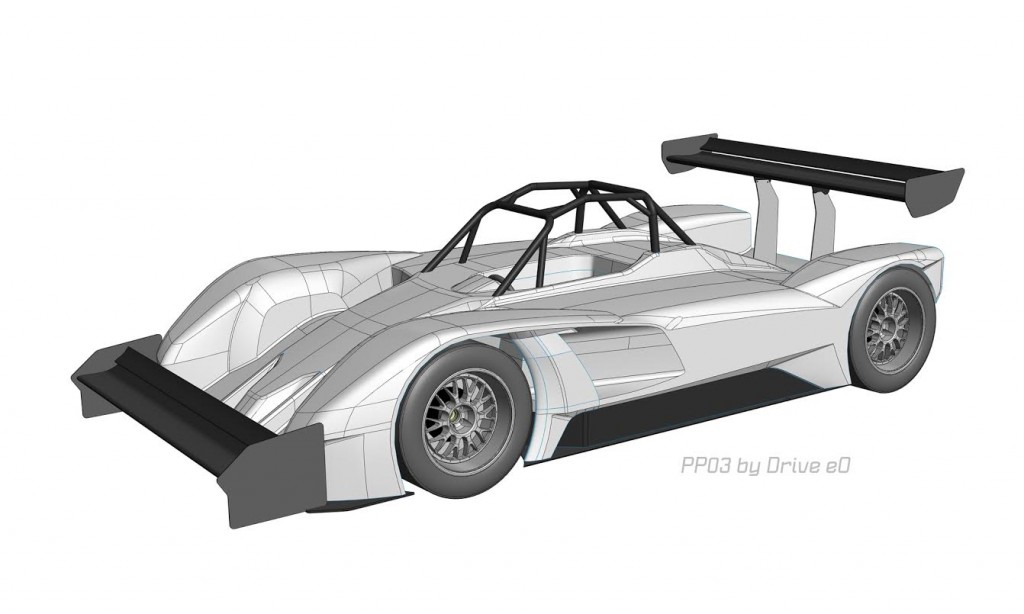Today, in the 93rd running of the Pikes Peak International Hill Climb, electric cars took 1st and 2nd places, the first time electric vehicle have won this event outright. The winner, Rhys Millen, himself a many-time winner of Pikes Peak races, including in 2014, is the son of Rod Millen who was a many-time Pikes Peak winner, and the father of Ryan Millen who was also driving an electric car today. He took 1st place with a 9:07.222 lap time driving a 1+ megawatt electric race car, the eO PP03, built by Latvian team Drive eO. Second place was taken by Nobuhiro “Monster” Tajima, also a many-many-time winner of Pikes Peak, who has raced electric the last few years, this time with an electric car built by Croatian electric supercar maker Rimac Automobil.
A handful of other electric powered racers, both motorcycle and car, entered this year. That they entered and finished as challenging a race as the Pikes Peak Hillclimb deserve recognition as well, but of course the news machine is going to focus on Millen and Tajima.
The results are marred somewhat by the weather at Pikes Peak this year. The weather was perfect perfect, until a thunderstorm cell formed at the top of the mountain, dumping lots of lightning and hail at the summit. If the thunderstorm had been worse, the race organizers would have had to cancel the last half of the race. (read more on gazette.com![]() ) Instead they shortened the course from 12 miles to 6 miles, and instead of climbing to 14+ thousand feet they’d climb to 11+ thousand feet. That gave 40+ drivers the chance to race, albeit on a shortened event.
) Instead they shortened the course from 12 miles to 6 miles, and instead of climbing to 14+ thousand feet they’d climb to 11+ thousand feet. That gave 40+ drivers the chance to race, albeit on a shortened event.
At the time I write this it’s not entirely clear to me how this affects the results. The rankings I give below aren’t the finalized results, but the raw results from LiveTiming.net![]() . That site says: “Because of the severe weather and course shortening ALL TIMES ARE INVALIDATED!!! Check the PPIHC website for final Official Results at a later time.”
. That site says: “Because of the severe weather and course shortening ALL TIMES ARE INVALIDATED!!! Check the PPIHC website for final Official Results at a later time.”
Rhys Millen and his son Ryan Millen both raced electric vehicles today. As already said, Rhys Millen drove a custom built electric car by Drive eO, a Latvian team that’s in its third year at Pikes Peak. The team had also raced a hybrid car in the Dakar challenge. The drive train produces 1020 kW (1367 hp) peak power thanks to a 50 kWh lithium-ion battery pack and six YASA-400 electric motors with in-house developed eO controllers. The team had hoped to come in with a 8:32-8:36 time, which would have been close to setting an outright record. But, something in the all-wheel-drive system (the motors powered both front and rear axles) broke, leaving only one axle with power. Even with performance hampered this way, his 9:07.222 time is astonishing and among the fastest ever recorded at Pikes Peak.
His son, Ryan Millen, was driving a modified Toyota RAV4 EV (2nd Generation). His time is unclear because he was in the group with a shortened race.
Monster Tajima, who was driving a car built by Rimac Automobil, has entered with an electric car for a few years now. His 65th birthday was today, not many people his age would be achieving such a feat as this. His time, 9:32.401 is also astonishing and among the fastest ever at Pikes Peak, and was the 2nd fastest overall today.
UPDATE: Honda had a highly modified all-electric all-wheel-drive CR-Z driven by Tetsuya Yamano, equipped with the company’s Super Handling All-Wheel Drive (SH-AWD) and Precision All-Wheel Steer (PAWS) systems, listed in the Exhibition class. He delivered a 10:23.829 time. See caradvice.com.au![]() for more details.
for more details.
The next fastest electric was a custom electric motorcycle, Mirai, by a Japanese team and ridden by Yoshihiro Kishimoto. His time was 10:58.861, which was good enough for #29 overall.
People with long enough memory might recall that in 2013, Lightning Motorcycles won the Pikes Peak motorcycle class outright – beating that years entire motorcycle field by 20 seconds![]() . That record was hit by Carlin Dunne riding a prototype version of what’s now called the Lightning LS-218, with a 10:00.694 time. This years fastest motorcycle was a Honda something-or-other ridden by Jeffrey Tiggert, for a 10:02.735 time.
. That record was hit by Carlin Dunne riding a prototype version of what’s now called the Lightning LS-218, with a 10:00.694 time. This years fastest motorcycle was a Honda something-or-other ridden by Jeffrey Tiggert, for a 10:02.735 time.
Next in the electrics was Joe Prussiano riding the Buckeye Current entry. The last few years the Buckeye Current team, a University team from The Ohio State University, has entered the TT ZERO race on the Isle of Man, and last year they took 3rd place with Rob Barber riding. This year they chose to enter the Pikes Peak race instead, and hoping to have Rob Barber riding. Instead, Barber was injured during practice and Joe Prussiano stepped in to replace him. Their time was 11:12.736 taking #32 overall.
Next in the electrics was a trio of riders supported by Hollywood Electrics, in the Electric Production Motorcycle class. All rode bikes manufactured by Zero Motorcycles, and Hollywood Electrics is an electric motorcycle dealer based in Hollywood CA. Jeff Clark had a 12:06.346 time, Nathan Barker a 12:37.161 time, and Brandon Nozaki-Miller had a 13:10.894 time. In Miller’s case, he’s fairly unique among electric motorcycle racers in that he’s never ridden a gas powered bike, and that the bike he raced today is his daily rider, a 2015 Zero SR, which he bought in February and after 100+ miles a day it has over 12,000 miles on the odometer.
The remaining electrics all had the shortened race. Hence, I don’t know how to report their results other than to say they finished.
The next was a pair of cars built by Entropy Racing. This team brought three identical electric race cars, with which they hope to eventually launch an electric car racing series. One of the cars broke during qualifying leaving them with two cars. They were driven by Tim O’Neil and Rick Knoop.
The next electric was the aforementioned 2nd generation Toyota RAV4 EV driven by Ryan Millen.
The last electric was a Honda Fit EV driven by Mike Tsay.
- Is there enough Grid Capacity for Hydrogen Fuel Cell or Battery Electric cars? - April 23, 2023
- Is Tesla finagling to grab federal NEVI dollars for Supercharger network? - November 15, 2022
- Tesla announces the North American Charging Standard charging connector - November 11, 2022
- Lightning Motorcycles adopts Silicon battery, 5 minute charge time gives 135 miles range - November 9, 2022
- Tesla Autopilot under US Dept of Transportation scrutiny - June 13, 2022
- Spectacular CNG bus fire misrepresented as EV bus fire - April 21, 2022
- Moldova, Ukraine, Georgia, Russia, and the European Energy Crisis - December 21, 2021
- Li-Bridge leading the USA across lithium battery chasm - October 29, 2021
- USA increasing domestic lithium battery research and manufacturing - October 28, 2021
- Electrify America building USA/Canada-wide EV charging network - October 27, 2021












